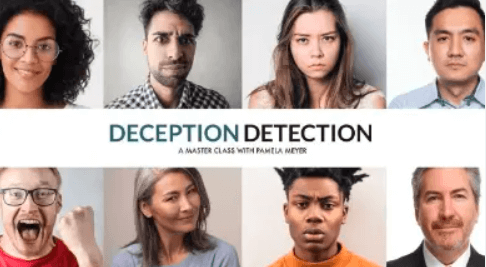Deception detection is a 21st-century skill that can dramatically improve one’s professional and personal effectiveness.
Learn to identify motivations for deception as they discover methods to spot deception and elicit the truth by carefully analyzing narrative statements.
File Size: 68.822 GB.
Pamela Meyer – Deception Detection: Interviewing and Getting to the Truth

Get to the truth in Four Steps!
What you’ll learn
-
Respond appropriately after noting verbal and nonverbal indicators of deceit
-
Elicit the truth from any subject using a simple 4 step framework
-
Recognize deceitful vs honest stories, based on story structure
-
Use psychological bridges to elicit information from difficult conversation partners
-
Prepare questions that promote a cooperative state of mind
-
Prepare an environment which promotes a cooperative state of mind in an interviewee
-
Identify the role of ethics in rapport building, questioning, and persuading an interviewee
-
Define rapport and describe its significance in an interview setting
-
Develop questions which can contribute to rapport between an interviewer and interviewee
-
Identify eight types of expert questions and when to use them in an interview
-
Identify eight types of expert questions and when to use them in an interview
-
Identify the distinguishing features of honest and deceitful stories
-
Identify the body language and behavior associated with an interviewee’s emotional state
-
Identify the type of question which can do the most harm in an interview setting
-
Define psychological bridge and use psychological bridges appropriately in an interview setting
Description
Deception costs businesses over $994 Billion per year, approximately 7% of annual revenue. In the presence of deception, transaction costs are substantially increased for human resources, research and development, due diligence, and management.
Deception detection is a 21st-century skill that can dramatically improve one’s professional and personal effectiveness. In this course on using interview skills to spot lies and get to the truth, participants learn to identify motivations for deception as they discover methods to spot deception and elicit the truth by carefully analyzing narrative statements. They also learn to profile their interview partner and use a simple but powerful framework for connecting deeply and coaxing the truth from any subject.
Interviewing and Getting to the Truth introduces a four-step framework for eliciting information from the most challenging subjects and outlines eight expert questions that can be successfully applied to reach the truth in any interview, negotiation, or conversation.
THE CLASS: The second course in the two-part series on Deception Detection, Interviewing and Getting to the Truth, this video-driven class is the most advanced course of its kind that offers a systematic framework for getting to the truth. This course includes 22 engaging videos, case studies, and a detailed workbook.
Once you sign up, you will have access to:
- Six course modules, containing videos, animations, reflections, and case studies
- Exclusive framework and systematic approach for getting to the truth that’s easy to learn and evidence-based.
- As one student put it, “A-plus!! Especially on entertainment value! Pamela Meyer’s PREP method of getting to the truth is a tool I now use all day long. You never know when you’re going to be on the wrong end of a lie, and I’m so grateful to know that I am prepared for those moments when they inevitably come.”
I can’t wait to see you in class! It’s lots of fun, and our community is growing fast.
Pamela Meyer
Who this course is for:
- Salespeople
- Investigators and Law Enforcement
- Mediators and Negotiators
- Judges, Attorneys and those in the Legal Profession
- HR Professionals
- Social Workers
- Educators
- Parents (especially parents of teenagers)
- Anyone seeking the skills to detect lies and uncover the truth in day-to-day life
Instructor
Want to be fully entertained while you learn? Come on in! You’ve come to the right place!
Pamela Meyer, “the nation’s best known expert on lying” (Reader’s Digest), is on a mission to help people take back the truth. Pamela’s TED talk, “How to Spot a Liar,” is a worldwide sensation. With over 30 million views and translated into more than 40 languages, it is the 11th most-watched TED talk of all time. The talk is based on her bestselling book, Liespotting: Proven Techniques to Detect Deception.
The stunning popularity of Pamela’s TED talk and book are solid testimony to the relevance and timeliness of her valuable work. Deception is serious business. According to studies by several different researchers, most of us encounter nearly 200 lies a day. It happens in person, on the phone, in email. It happens when buying, negotiating, interviewing, and interacting with colleagues, vendors, customers, friends, family, and others. In this environment it’s important to be equipped with the skills to protect yourself in your daily business and personal encounters.
Pamela brings years of knowledge – previously found only in the intelligence community, police training academies, and universities – to the effort to uncover the truth and build trust. She synthesizes her C-Suite business savvy with the critical deception detection skills she’s accumulated: advanced interviewing and interrogation techniques; facial micro-expression reading; body language interpretation; statement analysis; facial microexpression analysis, and behavior elicitation techniques. These techniques were developed by our national espionage, intelligence, security and law enforcement agencies over the last 75 years. They were refined by the top psychologists and psychiatrists at leading American research universities and think tanks. The result is a specialized body of information developed specifically to help business executives, managers, investment professionals, human resources specialists, lawyers, insurance professionals, corporate officers, and others detect deception and get the information they need to successfully conduct their most important interactions/transactions and build trust.
Pamela’s work and her BASIC method for detecting deception have been featured in Business Week, The Atlantic, Harvard Business Review, The Wall Street Journal, CNN, The New York Post, The Washington Post, Forbes, The Huffington Post, ABC News, Portfolio, Fox Radio, Cosmopolitan, and numerous syndicated radio and television programs.
Pamela is founder and CEO of Calibrate, in Washington, D.C. which trains businesses on fraud detection, deception detection, inside threat mitigation and security awareness. Pamela and her team work closely with business executives to offer a blend of hard skills training, business savvy and strategic insight.
Course Features
- Lectures 0
- Quizzes 0
- Duration 10 weeks
- Skill level All levels
- Language English
- Students 169
- Assessments Yes
